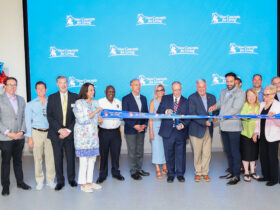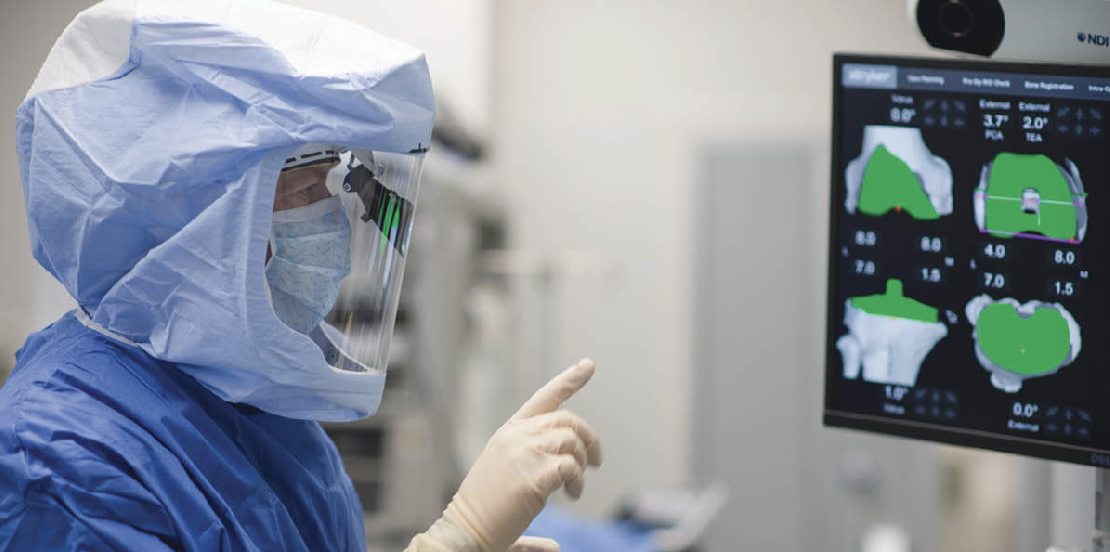In the field of orthopedics, Hospital for Special Surgery (HSS), is leading the way in the research, development and utilization of innovative treatments and new technologies to improve patient care. Consistently ranked No. 1 in the country for orthopedics by U.S. News & World Report, people have come to HSS from around the world for life-changing surgery when other doctors gave them no hope.
The expertise at HSS extends to nonsurgical care as well, with specialists who treat conditions affecting the musculoskeletal system. About 25 percent of people who come to HSS for a second opinion regarding surgery are told that it is not their best option.
“Our goal is to provide the most appropriate treatment, which may or may not be surgery at that time, and our patients appreciate a holistic approach,” explains Michael Ast, MD, an orthopedic surgeon specializing in knee and hip replacement at HSS Paramus. “The best treatment plan for a given patient often involves nonsurgical care by highly specialized doctors in primary care sports medicine, physiatry or rheumatology either by itself or in conjunction with a surgical plan.”
Convenient Locations for New Jersey Residents
HSS outpatient locations in Paramus and Saddle River provide access to the same physicians who see patients at the main hospital in Manhattan. Although surgeries are performed in New York City, patients can schedule their consultations, x-rays, MRIs, pre- and post-surgical care, and rehabilitation at HSS Paramus.
Technology and Innovation to Benefit Patients
Increasing numbers of orthopedic surgeons are using robotics, computer navigation and augmented reality (AR) to enhance precision, accuracy and predictability. An orthopedic surgeon at HSS performed the first knee replacement using AR in the United States in 2020. AR refers to digital content, such as a three-dimensional (3D) image, that is superimposed on a user’s view of the physical environment.
It starts with a CT scan to create a 3D model of the patient’s knee to plan and customize the procedure. During surgery, the use of “smart” glasses allows the surgeon to visualize the structures of the knee under the skin and track progress in real time directly on the operative field.
HSS spine surgeons have begun to use AR.
“The technology enables improved control and visualization of the patient’s anatomy and critical structures, which can lead to a more precise, efficient surgery and can enhance safety,” explains Gbolabo Sokunbi, MD, a spine surgeon at HSS Paramus and Saddle River. “Its versatility in minimally invasive surgery or hybrid techniques may also allow for quicker recovery because it can be employed in a way that causes less disruption to soft tissues.”
Lending a Hand: Robotic Arm Assists Spine Surgeons
In spine surgery, robotic assistance and computer navigation allow for a more precise procedure, says James Dowdell, MD, a spine surgeon at HSS Paramus and Saddle River.
Detailed images of a patient’s anatomy help plan and customize the procedure prior to surgery. CT and MRI scans create a 3D map of the patient’s spine, and a computer console displays the image in real time during surgery. The orthopedic surgeon uses a robotic arm for guidance, always maintaining full control, Dr. Dowdell explains.
“The system enables the surgeon to make very small incisions that preserve muscles and other structures surrounding the spine, so patients generally experience less pain after surgery, a shorter hospital stay and a quicker return to activities compared to traditional open surgery,” he says.
Robotic assistance and computer navigation are major players in joint replacement surgery.
“The robotic systems allow for the optimal alignment, soft tissue balancing and positioning of the implant – critical to the long-term success of a knee replacement,” explains Steven Haas, MD, chief of the Knee Service at HSS, who also sees patients at HSS Paramus.
“Smart Knee” for Remote Patient Monitoring
A “smart” knee replacement that collects and transmits data to monitor a patient’s recovery from afar became a reality in 2021 when orthopedic surgeons at HSS performed the first knee replacement containing a smart sensor. The device measures steps taken, walking speed, range of motion and other indicators of knee function following surgery.
An innovation in the field of remote patient monitoring, it was the first implantable device approved to collect data on an individual’s progress after a knee replacement. Although the technology doesn’t preclude office visits, it enables the doctor to actively monitor a patient’s recovery with real-world, objective data to supplement their care.
“Remote monitoring can be especially useful during the early post-operative period,” says Dr. Haas. “The earlier you identify a patient who may not be progressing as well as you would like, the sooner you can intervene.”
HSS Innovation Institute
HSS is the only hospital in the United States with an onsite 3D printing center making custom joint replacements to treat the most complex problems. Established through a relationship with LimaCorporate, the FDA-regulated facility has developed custom implants for patients at joint replacement centers around the country.
The endeavor is one of many projects made possible by the HSS Innovation Institute.
“The goal of the institute is to help develop and bring to market the next generation of innovative devices, techniques, and pathways to improve care and address complex problems not only for our own patients, but for individuals everywhere,” says Dr. Ast, who also serves as Chief Medical Innovation Officer at HSS.
In addition to the extraordinary amount of research conducted by HSS physicians, scientists and engineers, the institute forms collaborations with thought leaders, world-class organizations, and leading-edge companies outside of HSS.
One collaboration with global technology leader Zimmer Biomet Holdings, Inc. uses artificial intelligence to develop decision-support tools for robotic-assisted joint replacement surgery.
Evidence-based treatments, technology and surgical skill help to achieve the best patient outcomes, but there is more to the equation, Dr. Ast notes. He points to the culture of excellence and pride at HSS that inspires staff throughout the organization to maintain the highest standards of respectful, compassionate, patient-centered care.













